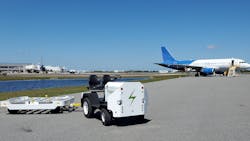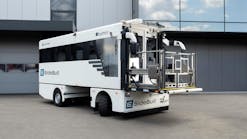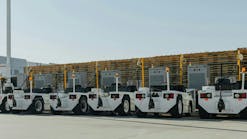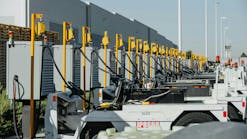Sustainability Steps Ground Support Professionals Can Take Today
During the 16th World Cargo Symposium (WCS) held in Istanbul last month, the International Air Transport Association (IATA) announced three priorities to continue to progress within the air cargo industry: sustainability, digitalization and safety.
“Air cargo is a critically important industry. We should always be guided by that fact. Our work is helping build a better future for the people of the world. We are in an industry that saves lives, delivering aid and relief to those in need,” said Brendan Sullivan, global head of air cargo at IATA. “We must work together to ensure that air cargo remains a reliable and efficient means of providing support to those in need, while simultaneously strengthening our global supply chains and contributing to the sustainable development of our economies.”
Contributing to a sustainable future doesn’t have to wait. And it starts with ground support professionals. From ensuring smooth turnarounds and on-time departures to helping increase efficiency in the air cargo supply chain, ground support equipment (GSE) plays a crucial role in the air cargo industry and contributing to the future of sustainability and safety.
Electric Vehicles
“At the 41st ICAO Assembly, governments agreed to the Long-Term Aspirational Goal (LTAG) of net zero carbon emissions by 2050, in line with the industry’s commitment adopted in 2021,” noted Sullivan.
Choosing the right tow tractor for ground support operations is crucial for crew safety, operations efficiency and productivity. It’s an easy first step in meeting sustainability goals for ground support operations.
Compared to a single internal combustion tractor emitting an average of 3,250 kilograms of CO2 annually, an electric tow tractor emits zero CO2 – helping reduce airports overall pollution output and contribute to IATA’s goal of zero carbon emissions by 2050. With the low-end torque, frequent start and stops, idle time and short required ranges, cargo tow tractors are particularly well-suited for electrification.
Going electric doesn’t stop at sustainability benefits. Electrification enables smart vehicle technology such as anti-roll over, programable speed controls and on-board diagnostics, further increasing productivity and safety for crews.
And with flexible charging options, electric GSE can adapt to the widest range of infrastructure readiness. For example, Tiger Lithium-Ion tow tractors can easily be charged using a traditional 110v or 220v single-phase outlet, the same used for electric cars, or a CAN-enabled smart industrial charger for fast charging.
Lithium-Ion Power
Incorporating Lithium-Ion power (Li-ion) into GSE can further enhance productivity in cargo towing and material handing through increased uptime and performance, all while lowering an operation’s overall carbon footprint. Advanced Li-ion batteries provide at least 3,000 cycles and great efficiency without power loss as the battery charge depletes.
Li-ion batteries last significantly longer than flooded lead-acid or AGM batteries – up to five times as long – contributing to a lower total cost of ownership (TCO). Li-ion batteries also perform better in cold weather. Due to the nature of flooded lead-acid batteries, users can experience up to a 50 percent decrease in battery life in cold weather temperatures. And while cold weather has a negative effect on all batteries, Li-ion batteries aren’t as affected.
Li-ion batteries also don’t require maintenance such as posts to be cleaned or fluid to be monitored or added, making them more reliable and further increasing uptime and saving overall costs. As such, Tiger Li-Ion tow tractors can see an annual savings of up to 85 percent compared to traditional fuel tractors.
Leading the Way to a Sustainable Future
“We must work together to ensure that air cargo remains a reliable and efficient means of providing support to those in need, while simultaneously strengthening our global supply chains and contributing to the sustainable development of our economies,” said Sullivan.
GSE plays a significant role in the air cargo industry, and it should play just as significant a role in the future of sustainability within the industry. A future that, by transitioning to electric fleets, can start today.
Gerry Hoadley is the director of ground support equipment (GSE) business at Waev Inc., an electric mobility provider founded in 2021 to manufacture, distribute, market and support the GEM, Taylor-Dunn and Tiger brands. In this position, Hoadley leads product and business development, customer sales and service for the Tiger tow tractor vehicle line.







